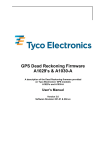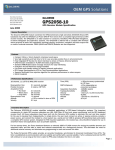Download GPS Firmware A1037-A
Transcript
GPS Firmware A1037-A A description of the standard GPS firmware provided on Tyco Electronics’ GPS modules A1037-A User’s Manual Version 2.0 Software Revision 4.30 This page was intentionally left blank. Revision History Revision History Rev. 0.1 1.1 1.2 2.0 Date 03-29-06 08-10-06 11-02-06 04-01-07 mm-dd-yy V2.0 – 04/07 Description Preliminary version Valid for X1037-A working on GPS-LIB.:4.23.05 Valid for A1037-A working on GPS-LIB.: 4.30.3plus New design User’s Manual Page 3 of 43 Disclaimer Disclaimer THIS DOCUMENT CONTAINS PROPRIETARY INFORMATION OF TYCO ELECTRONICS CORPORATION/POWER SYSTEMS (TYCO ELECTRONICS). IT MAY NOT BE COPIED OR TRANSMITTED BY ANY MEANS, PASSED TO OTHERS, OR STORED IN ANY RETRIEVAL SYSTEM OR MEDIA, WITHOUT PRIOR CONSENT OF TYCO ELECTRONICS OR ITS AUTHORIZED AGENTS. THE INFORMATION IN THIS DOCUMENT IS, TO THE BEST OF OUR KNOWLEDGE, ENTIRELY CORRECT. HOWEVER, TYCO ELECTRONICS CAN NEITHER ACCEPT LIABILITY FOR ANY INACCURACIES, OR THE CONSEQUENCES THEREOF, NOR FOR ANY LIABILITY ARISING FROM THE USE OR APPLICATION OF ANY CIRCUIT, PRODUCT, OR EXAMPLE SHOWN IN THE DOCUMENT. THE PRODUCT (HARD- AND SOFTWARE) DESCRIBED IN THIS DOCUMENTATION IS NOT AUTHORIZED FOR USE IN LIFE SUPPORT DEVICES OR SYSTEMS WITHOUT THE EXPRESS WRITTEN APPROVAL OF TYCO ELECTRONICS. THIS DOCUMENT MAY PROVIDE LINKS TO OTHER WORLD WIDE WEB SITES OR RESOURCES. BECAUSE TYCO ELECTRONICS HAS NO CONTROL OVER SUCH SITES AND RESOURCES, TYCO ELECTRONICS SHALL NOT BE RESPONSIBLE FOR THE AVAILABILITY OF SUCH EXTERNAL SITES OR RESOURCES, AND DOES NOT ENDORSE AND IS NOT RESPONSIBLE OR LIABLE FOR ANY CONTENT, ADVERTISING, PRODUCTS, OR OTHER MATERIALS ON OR AVAILABLE FROM SUCH SITES OR RESOURCES. TYCO ELECTRONICS SHALL NOT BE RESPONSIBLE OR LIABLE, DIRECTLY OR INDIRECTLY, FOR ANY DAMAGE OR LOSS CAUSED OR ALLEGED TO BE CAUSED BY OR IN CONNECTION WITH USE OF OR RELIANCE ON ANY SUCH CONTENT, GOODS OR SERVICES AVAILABLE ON OR THROUGH ANY SUCH SITE OR RESOURCE. TYCO ELECTRONICS RESERVES THE RIGHT TO CHANGE, MODIFY, OR IMPROVE THIS DOCUMENT OR THE PRODUCT DESCRIBED HEREIN, AS SEEN FIT BY TYCO ELECTRONICS WITHOUT FURTHER NOTICE. Page 4 of 43 User’s Manual V2.0 - 04/07 Table of Contents Table of Contents 1 Introduction ............................................................................................................ 7 1.1 General ............................................................................................................... 7 1.2 Serial Port Configuration ..................................................................................... 7 2 Standard NMEA Sentences ................................................................................... 8 2.1 Introduction ......................................................................................................... 8 2.2 Supported NMEA Sentences .............................................................................. 8 2.2.1 GGA - Global Positioning System Fix Data .................................................................. 9 2.2.2 VTG – Course Over Ground and Ground Speed ....................................................... 10 2.2.3 RMC - Recommended Minimum Specific GPS Data ................................................. 11 2.2.4 GSA - GPS DOP and Active Satellites ....................................................................... 12 2.2.5 GSV – GPS Satellites in View .................................................................................... 13 3 Proprietary Sentences.......................................................................................... 14 3.1 Introduction ....................................................................................................... 14 3.2 NMEA Sentence Handling and Baud Rate Set-up ............................................ 14 3.3 Start-up Support................................................................................................ 15 3.3.1 Avoiding Cold Start Behavior...................................................................................... 16 3.3.1.1 Dump Ephemeris.................................................................................................................... 16 3.3.1.2 Load Ephemeris ..................................................................................................................... 17 3.3.1.3 Dump Almanacs ..................................................................................................................... 17 3.3.1.4 Load Almanacs....................................................................................................................... 18 3.3.2 Cold Start.................................................................................................................... 18 3.3.3 Warm Start ................................................................................................................. 18 3.3.4 Hot Start ..................................................................................................................... 18 3.4 Version information ........................................................................................... 19 3.5 Support of SBAS (Satellite Based Augmentation Systems) .............................. 19 3.5.1 Enabling SBAS support .............................................................................................. 20 3.5.2 Toggle SBAS support ................................................................................................. 20 3.5.3 Choose SBAS satellite ............................................................................................... 20 3.6 SW-Reset.......................................................................................................... 20 4 Related Information.............................................................................................. 21 4.1 Contact.............................................................................................................. 21 4.2 Related Documents........................................................................................... 21 5 List of Tables........................................................................................................ 22 Appendix C: UART-Commands Reference............................................................. 23 PSTMALMANAC..................................................................................................... 24 PSTMCOLD ............................................................................................................ 25 PSTMDUMPALMANAC .......................................................................................... 26 PSTMDUMPEPHEMS ............................................................................................ 27 PSTMEPHEM ......................................................................................................... 28 PSTMGPSRESET................................................................................................... 29 PSTMGPSRESTART.............................................................................................. 30 V2.0 – 04/07 User’s Manual Page 5 of 43 Table of Contents PSTMHOT .............................................................................................................. 31 PSTMINFOREAD.................................................................................................... 32 PSTMINITGPS........................................................................................................ 33 PSTMNEACONFIG................................................................................................. 34 PSTMNMEAONOFF ............................................................................................... 35 PSTMRMC.............................................................................................................. 36 PSTMSBASONOFF ................................................................................................ 37 PSTMSBASSAT ..................................................................................................... 38 PSTMSBASSTART................................................................................................. 39 PSTMSRR .............................................................................................................. 40 PSTMSTBY............................................................................................................. 41 PSTMSTOP ............................................................................................................ 42 PSTMWARM........................................................................................................... 43 Page 6 of 43 User’s Manual V2.0 - 04/07 GPS Receiver Firmware A1037 1 Introduction 1.1 General This document contains a detailed description of Tyco Electronics’ standard GPS firmware used in the GPS modules A1037-A. The purpose of this paper is the explanation of the behavior of the “NMEA” interface, i.e. a description of the outputs coming from this interface, and a summary of the commands that can be issued to this interface. This will allow easy and full adjustment and control of the module. 1.2 Serial Port Configuration The firmware supports the bi-directional serial interface of Tyco Electronics’ GPS module. It is implemented by use of the full duplex UART (Universal Asynchronous Receiver Transmitter) interface of the GPS processor. • • • For the communication with UART the use of a kind of terminal program or another appropriate method is necessary. UART communication is always on port 0 (pin Tx0 and Rx0) of the module The default configuration of this serial port is: 4800 baud, 8 data bits, no parity, 1 stop bit, no flow control! Using Pin P0.13 two different set of GPS NMEA out messages with two different baud rates can be selected. CONF (P0.13) Leave unconnected / External pull-up External pull-down NMEA Messages Set NMEA: GGA – VTG – GSA – GSV Baud rate: 4800 Transmit mode: on UTC second NMEA: GGA – GSA – GSV - RMC – TG –TS - PA Baud rate: 57600 Transmit mode: on UTC second Default X Table 1: NMEA configuration This pin will be read by the software during the GPS software start-up only. Any changes in the setting afterwards will not affect the configuration. This interface is bi-directional, i.e. on the one side the output of the GPS modules (NMEA sentences, etc.) is sent to the UART interface, on the other side the UART interface can be used to send commands to Tyco Electronics’ GPS modules. V2.0 – 04/07 User’s Manual Page 7 of 43 GPS Receiver Firmware A1037 2 Standard NMEA Sentences 2.1 Introduction The National Marine Electronics Association created a uniform interface standard for digital data exchange between different marine electronic products back in the early nineteen-eighties. • • • • • NMEA information is transmitted from a ‘vendor’ in ‘sentences’ with a maximum length of 80 characters. The general format is: ”$<vendor><message><parameters>*<checksum><CR><LF>”. The combination of <vendor><message> is called address field. The vendor code for the Global Positioning System is “GP”. In this document NMEA sentences refer to the NMEA 0183 Standard. For details see: http://www.nmea.org http://www.nmea.org/pub/index.html For an introduction into GPS NMEA sentences see: http://home.mira.net/~gnb/gps/nmea.html 2.2 Supported NMEA Sentences The Tyco Electronics’ GPS firmware currently supports 6 NMEA sentences: • • • • • $GPGGA (default: ON) $GPVTG (default: ON) $GPRMC (default: OFF) $GPGSA (default: ON) $GPGSV (default: ON) The sentences that are switched on are transmitted with an update rate of 1/s. The following paragraphs give an overview of NMEA messages with example strings and short explanation. Page 8 of 43 User’s Manual V2.0 - 04/07 GPS Receiver Firmware A1037 2.2.1 GGA - Global Positioning System Fix Data e.g. $GPGGA,152145.000,4805.81931,N,01132.23172,E,1,04,2.5,607.75,M,47.6,M,,*67 (1) (2) (3) (4) (5) (6) $GPGGA 152145.000 4805.81931 N 01132.23172 E (7) 1 (8) (9) (10) (11) (12) (13) (14) (15) (16) 04 2.5 0607.75 M 47.6 M <empty> <empty> *67 Vendor and message identifier Universal time coordinated (15h 21m 45.000s) Latitude (48deg 05.81931min) North (or S for south) Longitude (011deg 32.23172min) East (or W for west) Fix quality: GPS fix valid (or 0 for fix not available or 2 for differential fix, also when SBAS data are used) Four satellites in view (min 00, max 12) Horizontal dilution of precision Antenna altitude above/below mean sea level (geoid) Unit of antenna altitude: meters Geoidal separation Unit of geoidal separation: meters Age of differential GPS data, null field when DGPS is not used Differential reference station ID, null field when DGPS is not used Checksum Table 2: GGA example and description V2.0 – 04/07 User’s Manual Page 9 of 43 GPS Receiver Firmware A1037 2.2.2 VTG – Course Over Ground and Ground Speed e.g. $GPVTG,169.3,T,,M,0.3,N,0.5,K*6B (1) (2) (3) (4) (5) (6) (7) (8) (9) (10) $GPVTG 169.3 T <empty> M 0.3 N 0.5 K *6B Vendor and message identifier Track degrees True Track degrees (not supported) Magnetic (not supported) Speed [knots] Knots Speed [kilometers per hour] Kilometers per hour Checksum Table 3: VTG example and description Page 10 of 43 User’s Manual V2.0 - 04/07 GPS Receiver Firmware A1037 2.2.3 RMC - Recommended Minimum Specific GPS Data e.g. $GPRMC,092516.000,A,4805.8021,N,01132.2243,E,1.9,183.8,270302,0.0,W*7B (1) (2) (3) (4) (5) (6) (7) (8) (9) (10) (11) (12) (13) $GPRMC 092516.000 A 4805.8021 N 01132.2243 E 1.9 183.8 270302 0.0 W *7B Vendor and message identifier UTC - Universal Time Coordinated (09h 25m 16.000s) Fix valid (or V for invalid or no fix) Latitude (48deg 05.8021min) North (or S for south) Longitude (011deg 32.2243min) East (or W for west) Speed over ground in knots Track made good, degrees true Date (ddmmyy – 27th March 2002) Magnetic variation, degrees West (or E for east) Checksum Table 4: RMC example and description V2.0 – 04/07 User’s Manual Page 11 of 43 GPS Receiver Firmware A1037 2.2.4 GSA - GPS DOP and Active Satellites e.g. $GPGSA,A,3,03,20,14,31,,,,,,,,,3.7,2.5,2.8*3D (1) (2) (3) (4) (5) (6) (7) (8) (9) (10) (11) (12) (13) (14) (15) (16) (17) (18) (19) $GPGSA A 3 03 20 14 31 <empty> <empty> <empty> <empty> <empty> <empty> <empty> <empty> 3.7 2.5 2.8 *3D Vendor and message identifier Selection mode Mode ID of 1st satellite used for fix ID of 2nd satellite used for fix ID of 3rd satellite used for fix ID of 4th satellite used for fix ID of 5th satellite used for fix ID of 6th satellite used for fix ID of 7th satellite used for fix ID of 8th satellite used for fix ID of 9th satellite used for fix ID of 10th satellite used for fix ID of 11th satellite used for fix ID of 12th satellite used for fix PDOP in meters HDOP in meters VDOP in meters Checksum Table 5: GSA example and description Page 12 of 43 User’s Manual V2.0 - 04/07 GPS Receiver Firmware A1037 2.2.5 GSV – GPS Satellites in View e.g. $GPGSV,1,1,04,03,27,159,45,14,43,095,48,20,17,231,40,31,60,190,42*7F (1) (2) (3) (4) (5) (6) (7) (8) (9) (10) (11) (12) (13) (14) (15) (16) (17) (18) (19) (20) (21) $GPGSV 1 1 04 03 27 159 45 14 43 095 48 20 17 231 40 31 60 190 42 *7F Vendor and message identifier Total numbers of messages Number of current message Satellites in view Satellite number Elevation in degrees Azimuth in degrees to true SNR in dB Satellite number Elevation in degrees Azimuth in degrees to true SNR in dB Satellite number Elevation in degrees Azimuth in degrees to true SNR in dB Satellite number Elevation in degrees Azimuth in degrees to true SNR in dB Checksum Table 6: GSV example and description V2.0 – 04/07 User’s Manual Page 13 of 43 GPS Receiver Firmware A1037 3 Proprietary Sentences 3.1 Introduction Device manufacturer define extensions of the standard NMEA protocol or sentences thereof. • • • The general format is: ”$<vendor><message><parameters><CR><LF>”. Note that a checksum is NOT required! The combination of <vendor><message> is called address field. The general format of the address field (vendor + message identifier) is: ”P<manufacturer code><message code> with “P” for proprietary”. 3.2 NMEA Sentence Handling and Baud Rate Set-up The following commands handle the configuration of NMEA outputs. • • $PSTMNMEAONOFF: Toggle NMEA sentences $PSTMRMC: Toggle RMC sentence Configures NMEA $PSTMNMEACONFIG,<NMEACONCODE> Arguments: NMEACONCODE Code for NMEA output sentences configuration, syntax: 0,xxxxxxx,yyyy,z xxxxxxx yyyy z Description: UART baud rate Output message list (see below) 0 to transmit on UTC second 1 to transmit after FIX This command configures baud rate, message list and transmit mode of NMEA output sentences. No response! See also: --- Table 6: NMEA sentences update part 1 Message list: The message list is the sum of the IDs of each message included to the list. Example: to have GSA and GSV output messages the message list must be 12. Page 14 of 43 User’s Manual V2.0 - 04/07 GPS Receiver Firmware A1037 Available NMEA output messages, message IDs: Message GGA5 NMEA GGA NMEA GSA NMEA GSV NMEA VTG NMEA RMC NMEA ID 1 2 4 8 16 64 Table 7: NMEA sentences update part 2 3.3 Start-up Support In order to improve the TTFF (Time to First Fix) after the receiver module was switched off the start up can be supported by providing a rough time and position information. The date/time provided should be exact to a few minutes, while for the position information a very rough estimation will help already. Tests did show positive results even with uncertainties of 1,000km. The command for setting time and position has the following format: • $PSTMINITGPS,<position&time> To set <position&time> the following syntax is valid: position&timecode Code for setting new position and time, syntax: xxxx.xxx,[N/S],yyyyy.yyy,[E/W],zzzz,DD,MM,YYYY,HH,MM,SS xxxx.xxx: latitude in degrees, minutes and fractions of minutes north or south [N/S]: yyyyy.yyy: longitude in degrees, minutes and fractions of minutes east or west [E/W]: altitude in meters zzzz: day of month DD: month MM: year YYYY: hour HH: minute MM: SS: second Table 8: GPS start up support V2.0 – 04/07 User’s Manual Page 15 of 43 GPS Receiver Firmware A1037 For example to set the date to March 25, 2006, the time to 1:05 p.m. and the location is closed to Munich, Germany the command will look like this: • $PSTMINITGPS,4804.000,N,01139.000,E,0500,25,03,2006,13,05,00 Please note that the position is accepted only, if the number of digits before and after the decimal point is correct. For the latitude 4 digits before and 3 digits after the decimal point are required, for the longitude 5 digits before and again 3 digits after, respectively. 3.3.1 Avoiding Cold Start Behavior A1037-A is a ROM based GPS receiver module. Powering down the module will delete all ephemeris and almanac data in the GPS engine and will end in a cold start next time the module will be powered on again. This can be avoided by reading out the ephemeris / almanacs before powering down the module and reload it after powering up the module again. Please note: Ephemeris data are valid for 4 hours Almanac data are valid for 3 month 3.3.1.1 Dump Ephemeris • $PSTMDUMPEPHEMS This command sends out all ephemeris stored in the backup RAM in this format: e.g. $PSTMEPHEM,1,3,<byte1>,<byte2>,…,<byteN>*7F (1) (2) (3) (4) (5) (6) (7) $PSTMEPHEM 1 3 <byte1> <byte2> <byteN> *7F Vendor and message identifier Satellite ID Number of the ephemeris data bytes First byte of ephemeris data Second byte of ephemeris data Last byte of ephemeris data Checksum Table 9: Ephemeris data output Page 16 of 43 User’s Manual V2.0 - 04/07 GPS Receiver Firmware A1037 3.3.1.2 Load Ephemeris • $PSTMEPHEM This command load ephemeris data into backup RAM. This will end up in hot start. e.g. $PSTMEPHEM,1,3,<byte1>,<byte2>,…,<byteN>*7F (1) (2) (3) (4) (5) (6) (7) $PSTMEPHEM 1 3 <byte1> <byte2> <byteN> *7F Vendor and message identifier Satellite ID Number of the ephemeris data bytes First byte of ephemeris data Second byte of ephemeris data Last byte of ephemeris data Checksum Table 10: Load ephemeris data 3.3.1.3 Dump Almanacs • $PSTMDUMPALMANAC This command sends out almanacs stored in the backup RAM in this format: e.g. $PSTMALMANAC,1,3,<byte1>,<byte2>,…,<byteN>*7F (1) (2) (3) (4) (5) (6) (7) $PSTMALMANAC 1 3 <byte1> <byte2> <byteN> *7F Vendor and message identifier Satellite ID Number of the almanac data bytes First byte of almanac data Second byte of almanac data Last byte of almanac data Checksum Table 11: Almanac data output V2.0 – 04/07 User’s Manual Page 17 of 43 GPS Receiver Firmware A1037 3.3.1.4 Load Almanacs • $PSTMALMANAC This command load almanac data into backup RAM. This will end up in warm start. e.g. $PSTMALMANAC,1,3,<byte1>,<byte2>,…,<byteN>*7F (1) (2) (3) (4) (5) (6) (7) $PSTMEPHEM 1 3 <byte1> <byte2> <byteN> *7F Vendor and message identifier Satellite ID Number of the almanac data bytes First byte of almanac data Second byte of almanac data Last byte of almanac data Checksum Table 12: Load almanac data 3.3.2 Cold Start • $PSTMCOLD This command erases all the almanacs and ephemeris, stored in the backup RAM and then reboots the system. 3.3.3 Warm Start • $PSTMWARM This command erases all ephemeris, stored in the backup RAM and then reboots the system. 3.3.4 Hot Start • $PSTMHOT This command reboots the system without erasing any data. Page 18 of 43 User’s Manual V2.0 - 04/07 GPS Receiver Firmware A1037 3.4 Version information A special command is implemented in order to return the serial number of ST GPS engine. • $PSTMINFOREAD: Initiates serial number output The version information will be returned in the following format: $PSTMVER, GPSLIB_04.23.05PAL ARM – DEC 02 2005 11:14:50,SW COMMANDS rel 1.0 (Dec 02 2005 12:22:53)*47 3.5 Support of SBAS (Satellite Based Augmentation Systems) Starting with firmware version 4.30.00, the A1037 will support Satellite Based Augmentation Systems (SBAS) systems. Two systems around the world transmit signals that can be interpreted by the receiver. As normal GPS satellites, the geostationary satellites that are used for the transmission of the information are identified by a unique PRN (Pseudo Random Noise number), a satellite ID. This is the PRN ID information for WAAS (Wide Area Augmentation System) and EGNOS (European Geostationary Navigation Overlay System); The following PRNs have been allocated to the WAAS system (region: USA, Canada and Mexico): PRN 122 - Inmarsat 3F4 AOR-W at 142.0º W PRN 134 - Inmarsat 3F3 POR at 178.0º E PRN 135 –Galaxy 15 PanAmSat at 133.0° W PRN 138 – Anik F1R at 107.3° W The following PRNs have been allocated to the EGNOS system (region: Europe, Africa and Venezuela): PRN 120 - Inmarsat 3F2 AOR-E at 15.5º W PRN 124 - Artemis at 21.5º E PRN 126 - Inmarsat 3F5 IOR-W at 25.0º E PRN 131 - Inmarsat 3F1 IOR-E at 64.0º E The following PRNs have been allocated to the MSAS system (region: Japan, Australia and Hawaii): PRN 129 - MTSAT 1 at 140.0° E PRN 137 - MTSAT 2 at 145.0° E V2.0 – 04/07 User’s Manual Page 19 of 43 GPS Receiver Firmware A1037 3.5.1 Enabling SBAS support By default, SBAS support is switched off. To switch on SBAS support one needs to issue the following command to the receiver: • $PSTMSBASSTART In recognition of the command the receiver will respond with SBAS version information: 3.5.2 Toggle SBAS support • $PSTMSBASONOFF This command will toggle the SBAS support. If the SBAS was active, this command will stop SBAS support and vice versa. 3.5.3 Choose SBAS satellite • $PSTMSBASSAT,120 After issuing this command the GPS engine will start to track the SBAS Satellite 120. If the parameter is “0” the system automatically searches for the SBAS satellite which is available in the user region. 3.6 SW-Reset This command will reset the GPS engine. The command is named: • $PSTMGPSRESET Page 20 of 43 User’s Manual V2.0 - 04/07 GPS Receiver Firmware A1037 4 Related Information 4.1 Contact This manual was created with due diligence. We hope that it will be helpful to the user to get the most out of the GPS module. Anyway, inputs about errors or mistakable verbalizations and comments or proposals to TYCO Electronics, Power Systems in Munich, Germany, for further improvements are highly appreciated. Tyco Electronics Power Systems Finsinger Feld 1 85521 Ottobrunn, Germany Tel.: +49 89 6089 838 Fax: +49 89 6089 835 [email protected]. www.tycoelectronics.com/gps. Further contact addresses: [email protected]. [email protected]. [email protected]. 4.2 Related Documents • • Manual: T.E. GPS Receivers A1037 (TYCO) Manual: T.E. GPS Evaluation Kit EVA1037-A (TYCO) V2.0 – 04/07 User’s Manual Page 21 of 43 List of Tables and Figures 5 List of Tables Table 1: NMEA configuration ................................................................................... 7 Table 2: GGA example and description ................................................................... 9 Table 3: VTG example and description .................................................................. 10 Table 4: RMC example and description ................................................................. 11 Table 5: GSA example and description.................................................................. 12 Table 6: GSV example and description.................................................................. 13 Table 6: NMEA sentences update part 1 ............................................................... 14 Table 7: NMEA sentences update part 2 ............................................................... 15 Table 8: GPS start up support................................................................................ 15 Table 9: Ephemeris data output ............................................................................. 16 Table 10: Load ephemeris data ............................................................................. 17 Table 11: Almanac data output .............................................................................. 17 Table 12: Load almanac data................................................................................. 18 Page 22 of 43 User’s Manual V2.0 - 04/07 Appendix UART Commands Appendix C: UART-Commands Reference The following is an explanation of all UART commands (in alphabetical order) that will be recognized by the module with the current firmware revision. The following notation is used: (option) <position> [a,b,c] optional parameters option placeholder position selection of a or b or c Example 1: $PSTMNMEACONFIG,0,4800,65,1 This command will output RMC and GGA NMEA sentences with 4800 baud after getting a fix. V2.0 – 04/07 User’s Manual Page 23 of 43 Appendix UART Commands PSTMALMANAC $PSTMALMANC,<almanacs data> Arguments: Description: See also: Page 24 of 43 Almanacs data Load Almanacs data Code for loading almanacs: <sat ID>,<N>,<byte1>,<byte2>,…,<byteN>*7F Load almanacs data into backup RAM 3.3.1.4 Load Almanacs User’s Manual V2.0 - 04/07 Appendix UART Commands PSTMCOLD Perform COLD start $PSTMCOLD Arguments: Description: none See also: -- V2.0 – 04/07 Perform COLD Start. This command erases all the almanacs and ephemerides, stored in the backup RAM and then reboots the system. User’s Manual Page 25 of 43 Appendix UART Commands PSTMDUMPALMANAC Dump almanacs $PSTMDUMPALMANAC Arguments: Description: See also: Page 26 of 43 None This command sends out all almanac data stored in the back up RAM. 3.3.1.3 Dump Almanacs User’s Manual V2.0 - 04/07 Appendix UART Commands PSTMDUMPEPHEMS Dump ephemeris $PSTMDUMPEPHEMS Arguments: Description: See also: V2.0 – 04/07 none This command sends out all ephemeris data stored in the back up RAM. 3.3.1.1 Dump Ephemeris User’s Manual Page 27 of 43 Appendix UART Commands PSTMEPHEM $PSTMEPHEM,<ephemeris data> Arguments: Description: See also: Page 28 of 43 Ephemeris data Load ephemeris data Code for loading ephemeris: <sat ID>,<N>,<byte1>,<byte2>,…,<byteN>*7F Load ephemeris data into backup RAM 3.3.1.2 Load Ephemeris User’s Manual V2.0 - 04/07 Appendix UART Commands PSTMGPSRESET Reset the GPS engine $PSTMGPSRESET Arguments: None Description: This command resets the GPS module. See also: No response! --- V2.0 – 04/07 User’s Manual Page 29 of 43 Appendix UART Commands PSTMGPSRESTART Restarts the GPS engine $PSTMGPSRESTART Arguments: None Description: This command restarts the GPS module. See also: No response! --- Page 30 of 43 User’s Manual V2.0 - 04/07 Appendix UART Commands PSTMHOT Perform HOT start $PSTMHOT Arguments: Description: none Perform HOT Start. This command reboots the system without erasing any backup data. No response! See also: V2.0 – 04/07 User’s Manual Page 31 of 43 Appendix UART Commands PSTMINFOREAD Initiates serial number output $PSTMINFOREAD Arguments: none Description: Initiates serial number output Issuing this command leads to a one time output of the module serial number See also: Page 32 of 43 --- User’s Manual V2.0 - 04/07 Appendix UART Commands PSTMINITGPS $PSTMINITGPS,<position&timecode> Initialize GPS position and time Arguments: position& Code for setting new position and time, syntax: timecode xxxx.xxx,[N/S],yyyyy.yyy,[E/W],zzzz,DD,MM,YYYY,HH,MM,SS latitude in degrees, minutes and fractions of minutes north or south [N/S]: yyyyy.yyy: longitude in degrees, minutes and fractions of minutes east or west [E/W]: altitude in meters zzzz: day of month DD: month MM: year YYYY: hour HH: minute MM: SS: second xxxx.xxx: Description: Initialize GPS position and time. This additional information will help to speed-up the starting time under certain circumstances. No response! --See also: V2.0 – 04/07 User’s Manual Page 33 of 43 Appendix UART Commands PSTMNEACONFIG Configures NMEA $PSTMNMEACONFIG,<NMEACONCODE> Arguments: NMEACONCODE Code for NMEA output sentences configuration, syntax: 0,xxxxxxx,yyyy,z xxxxxxx yyyy z UART baud rate Output message list (see below) 0 to transmit on UTC second 1 to transmit after FIX Description: This command configures baud rate, message list and transmit mode of NMEA output sentences. No response! --See also: Message list: The message list is the sum of the IDs of each message included to the list. Example: to have GSA and GSV output messages the message list must be 12. Available NMEA output messages, message IDs: Message GGA NMEA GSA NMEA GSV NMEA VTG NMEA RMC NMEA Page 34 of 43 ID 1 4 8 16 64 User’s Manual V2.0 - 04/07 Appendix UART Commands PSTMNMEAONOFF Toggle NMEA output message $PSTMNMEAONOFF Arguments: Description: None Controls NMEA output sentences Toggle the NMEA output message. If it has been switched ON before it becomes switched OFF and vice versa. See also: V2.0 – 04/07 User’s Manual Page 35 of 43 Appendix UART Commands PSTMRMC Toggle RMC message $PSTMRMC Arguments: Description: none Controls NMEA sentence $GPRMC Toggle the NMEA output message. If it has been switched ON before it becomes switched OFF and vice versa. See also: Page 36 of 43 User’s Manual V2.0 - 04/07 Appendix UART Commands PSTMSBASONOFF Toggle SBAS support $PSTMSBASONOFF Arguments: Description: none This command will toggle the SBAS support. If the SBAS was active, this command will stop SBAS support and vice versa. No Response! See also: V2.0 – 04/07 User’s Manual Page 37 of 43 Appendix UART Commands PSTMSBASSAT Change SBAS satellite $PSTMSBASSAT<SBAS ID> Arguments: Description: SBAS ID Number of SBAS satellite After issuing this command the GPS engine will start to track the dedicated SBAS Satellite. If the parameter is “0” the system automatically searches for the SBAS satellite which is available in the user region. No Response! See also: Page 38 of 43 User’s Manual V2.0 - 04/07 Appendix UART Commands PSTMSBASSTART Start SBAS support $PSTMSBASSTART Arguments: Description: none SBAS support will be started Response: output of SBAS version information See also: V2.0 – 04/07 User’s Manual Page 39 of 43 Appendix UART Commands PSTMSRR Reset of the GPS Software $PSTMSRR Arguments: None Description: This command reset the Software running on the GPS engine. See also: No response! --- Page 40 of 43 User’s Manual V2.0 - 04/07 Appendix UART Commands PSTMSTBY $PSTMSTBY,(T) Put the GPS engine in standby mode Arguments: T Standby period (seconds); Acceptable values are from 0 to 99999 Description: Put the system in Standby mode. If T is 0 then the system goes in standby mode for undefined time and can be waked up by hardware. Response only if the input is incorrect: $PSTMSTBYERROR*<checksum> See also: V2.0 – 04/07 User’s Manual Page 41 of 43 Appendix UART Commands PSTMSTOP Stop the GPS engine $PSTMSTOP,(T) Arguments: T Stop period (seconds); Acceptable values are from 0 to 99999 Description: Stop the GPS engine for a T time. After the defined time frame the system will be reset. Response only if the input is incorrect: $PSTMSTOPERROR*<checksum> See also: Page 42 of 43 User’s Manual V2.0 - 04/07 Appendix UART Commands PSTMWARM Perform WARM start $PSTMWARM Arguments: Description: none Perform WARM Start. This command erases all the ephemerides, stored in the backup RAM and then reboots the system. No response! See also: V2.0 – 04/07 User’s Manual Page 43 of 43

















































